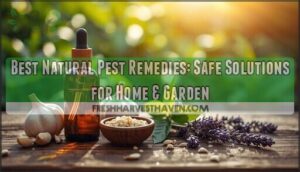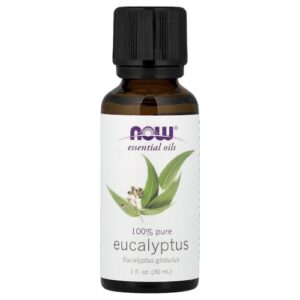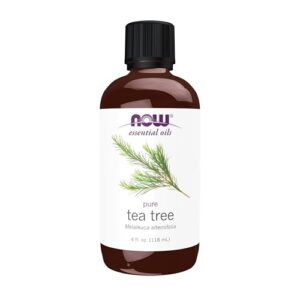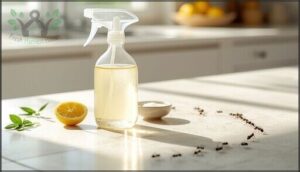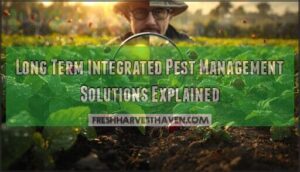This site is supported by our readers. We may earn a commission, at no cost to you, if you purchase through links.
A single jar of neem oil in your garden shed can handle pests that would otherwise cost you dozens of store-bought sprays. Chemical pesticides do the job fast, but they leave behind residue in your soil, water, and food.
Nature already offers dozens of remedies that work just as well — without the toxic tradeoff. From crushed eggshells to garlic sprays, the best natural pest remedies use ingredients you likely already have at home. Some protect your garden while others guard your kitchen.
This guide walks you through the most effective options for both.
Table Of Contents
- Key Takeaways
- Why Choose Natural Pest Remedies Over Chemicals
- Top 3 Natural Pest Control Products
- Best Homemade Pest Control Sprays and Solutions
- Effective Natural Barriers and Physical Deterrents
- Biological Control and Companion Planting Strategies
- Frequently Asked Questions (FAQs)
- What is the most effective natural insect repellent?
- Can you get rid of pests naturally?
- How do I get rid of pests in my home?
- Are there natural pest control solutions for plants?
- Are herbs good for pest control?
- Are natural pest control solutions a good idea?
- How many natural pest control remedies are there?
- What is the best natural pest repellent?
- What home remedy keeps bugs away?
- What scent do all pests hate?
- Conclusion
Key Takeaways
- Neem oil spray (mixed 1–2% with water and mild soap) is one of the most versatile homemade solutions, targeting aphids, whiteflies, mealybugs, caterpillars, and spider mites without harsh chemicals.
- Physical barriers like crushed eggshells, coffee grounds, and copper tape offer simple, chemical-free ways to protect plants from slugs and snails while doubling as soil enrichers.
- Companion planting — such as marigolds near tomatoes or nasturtiums around cucumbers — naturally disrupts pest feeding and lures harmful insects away, reducing the need for any sprays at all.
- Lemon eucalyptus oil is the only plant-derived repellent backed by the CDC, making it the strongest natural choice for keeping mosquitoes at bay for hours at a time.
Why Choose Natural Pest Remedies Over Chemicals
Chemical pesticides might seem like a quick fix, but they often come with hidden costs that affect your family, your garden, and the environment.
Switching to natural pest control methods can protect what matters most without the trade-offs.
When you choose natural pest remedies, you’re making a smarter choice that keeps your space safe without the toxic side effects. Here are four compelling reasons to ditch the chemicals and go natural.
Protecting Beneficial Insects and Pollinators
Pollinator conservation starts in your own yard. When you choose natural pest control methods over harsh chemicals, you protect bees, butterflies, and beneficial insects that keep your ecosystem balance healthy. These creatures aren’t just pretty visitors—they’re essential workers.
Here’s how natural pest repellents and organic gardening tips support wildlife preservation:
- Plant bee friendly plants that bloom at different times for continuous nectar sources
- Skip broad spectrum pesticides that harm pollinators visiting your flowers
- Use nontoxic insect repellents and ecofriendly household solutions instead of synthetic chemicals
- Leave patches of undisturbed ground to create safe insect habitat for ground nesting bees
- Apply any treatments during early morning or late evening when pollinators aren’t active
For gardeners interested in a thorough strategy, adopting helps protect pollinators while effectively controlling pests. Your garden becomes a refuge when you embrace these simple changes!
Safer for Children, Pets, and Wildlife
Natural pest control methods give you peace of mind when little ones and furry friends explore your yard. Plant-derived compounds in nontoxic insect repellents have lower toxicity than synthetic options, and they break down faster in the environment. That means less risk if curious kids touch treated plants or pets sniff around garden beds!
Natural pest remedies break down fast and stay low-toxicity, giving kids and pets a safer yard to explore
| Safety Feature | Why It Matters |
|---|---|
| Child-resistant caps | Prevents accidental access to concentrates |
| Milder odors | Reduces irritation for sensitive noses |
| Dilution guidelines | Minimizes skin and eye exposure risks |
| Quick breakdown | Less contact time for wildlife visitors |
Eco-friendly household solutions and organic pest control protect wildlife conservation efforts too. Birds, small mammals, and beneficial critters won’t encounter persistent residues when you use natural remedies. Labels on pet-friendly gardens products specify safe handling and reapplication timing—just follow child safety tips to keep everyone protected while you manage pesky invaders naturally.
Reducing Soil and Water Contamination
You’re protecting more than just your backyard when you skip harsh chemicals. Organic pest control keeps synthetic pesticides out of the ground, cutting nitrogen leaching by up to thirty percent in many systems.
Green infrastructure like buffer zones traps runoff before it reaches streams, while sustainable farming practices reduce soil erosion and water pollution—keeping your garden healthy and waterways clean.
Incorporating conservation buffer strategies is another proven way to reduce water contamination risk.
Cost-Effective and Accessible Solutions
Your wallet wins when you swap toxic sprays for low-cost methods already in your pantry. Natural pest control using household items for pest control costs a fraction of store-bought chemicals.
Here’s what makes DIY solutions and affordable products so appealing:
- Essential oils for pest control cover large areas with just a few drops
- Nontoxic pest solutions like vinegar and baking soda run under five dollars
- DIY pest repellents last months when stored properly
These eco-friendly tips and natural remedies prove effective without the premium price tag.
Top 3 Natural Pest Control Products
Not all pest control products are created equal, so it pays to know which ones actually work.
Products like multi-pest repellents with natural cedarwood scent are worth a closer look, especially if you have pets or kids playing outdoors.
These three stand out for being safe, effective, and easy to find.
Let’s take a look at each one.
1. Eucalyptus Essential Oil
Eucalyptus essential oil is one of those quiet powerhouses in your pest control toolkit. Its sharp, clean scent does a great job deterring mosquitoes and pesky garden insects alike.
NOW Foods offers a steam-distilled, 100% pure Eucalyptus Globulus oil that works well for this purpose. Mix a few drops with water in a spray bottle and apply around doorways and garden beds. Just remember — always dilute it properly and keep it away from food areas and curious little hands.
| Best For | People looking for a natural, versatile essential oil they can use for aromatherapy, sinus relief, and even as a gentle pest deterrent around the home. |
|---|---|
| Primary Use | Aromatherapy & wellness |
| Pest Control | Repels insects when diffused |
| Purity/Quality | 100% pure, steam distilled |
| Application Method | Dilute with carrier oil |
| Safety Note | Use with carrier oil |
| Package Size | 1 oz bottle |
| Additional Features |
|
- It’s 100% pure and steam-distilled, so you’re getting a high-quality oil without any fillers or synthetic additives.
- Super versatile — works great for aromatherapy, massage, helping clear nasal congestion, and even freshening up laundry.
- NOW Foods is a well-known brand, so you can trust you’re getting a solid, reliable product.
- The packaging isn’t the sturdiest, so there’s a real chance the bottle could crack or leak during shipping.
- The scent is pretty intense, which is awesome for some people but might be a bit much for others.
- You can’t just apply it directly for most uses — it needs to be diluted with a carrier oil first.
2. Now Tea Tree Essential Oil
Tea tree oil is a true multi-tasker in the context of natural pest control. NOW Foods’ version is 100% pure and steam-distilled, so you’re getting solid quality straight out of the bottle.
Mix a few drops with water and spray it around your home or garden to help keep ants, spiders, and other unwanted visitors at bay. It’s vegan and cruelty-free, too. Just dilute it properly before use — the undiluted oil is pretty concentrated and can irritate skin.
| Best For | People looking for a versatile, natural solution to deal with household pests, skin issues, and general cleaning without relying on harsh chemicals. |
|---|---|
| Primary Use | Pest control & cleaning |
| Pest Control | Repels insects & pests |
| Purity/Quality | 100% pure, steam distilled |
| Application Method | Dilute before direct use |
| Safety Note | Dilute; avoid eyes/skin |
| Package Size | 4 oz bottle |
| Additional Features |
|
- It’s 100% pure and steam-distilled, so you’re actually getting good quality oil without any filler or additives.
- Super versatile — you can use it for pest control, skincare, cleaning, or even toss a few drops in a diffuser for aromatherapy.
- Vegan and cruelty-free, which is a nice bonus if that matters to you.
- It’s pretty concentrated, so you’ll need to dilute it before using it on skin or around the house — skipping that step can cause irritation.
- Not everyone reacts well to it; some people may get skin irritation or an allergic reaction, so it’s worth doing a small patch test first.
- You’ll want to keep it away from kids and pets unless you’re supervising, since undiluted oil can be harmful if misused.
3. Kraftex Copper Adhesive Tape
Copper tape might surprise you as a pest control tool. Kraftex makes a self-adhering copper tape that works beautifully as a slug barrier.
Simply wrap it around your garden pots to create a protective ring. Slugs don’t like crossing copper — it irritates them on contact.
The tape is two inches wide and 33 feet long, so one roll covers a lot of ground. It’s a simple, chemical-free way to keep your plants safe.
| Best For | Gardeners, DIY enthusiasts, and hobbyists looking for a versatile, chemical-free solution to pest control, crafting, or electronics projects. |
|---|---|
| Primary Use | Slug deterrence & crafting |
| Pest Control | Deters slugs via copper barrier |
| Purity/Quality | 100% copper material |
| Application Method | Adhere to surfaces directly |
| Safety Note | Handle carefully; thin material |
| Package Size | 2 in × 33 ft roll |
| Additional Features |
|
- A single 33-foot roll gives you plenty of tape for multiple pots or projects without running out quickly.
- It’s a natural, chemical-free way to keep slugs off your plants — no harsh pesticides needed.
- Beyond the garden, it pulls double duty for EMI shielding, stained glass work, and other crafts.
- The tape is pretty thin, so it can tear if you’re not careful while unrolling or applying it.
- The adhesive can be weak in some spots, which means it might not stick as securely in humid or wet conditions.
- If you wrap it around pots but miss a gap, slugs will find their way through — placement matters.
Best Homemade Pest Control Sprays and Solutions
Making your own pest control sprays is easier than you’d think. You probably already have most of the ingredients sitting in your kitchen right now.
Here are five simple recipes that work well for both your home and garden.
Neem Oil Spray for Garden Insects
Neem oil is one of the best natural insecticides you can make at home. It disrupts insect growth and feeding without harsh chemicals. Mix 1-2% neem oil with water and a drop of mild soap. Spray early morning or late evening for best results.
| What It Targets | How It Helps |
|---|---|
| Aphids | Stops feeding and growth |
| Whiteflies | Disrupts egg development |
| Mealybugs | Blocks larval maturity |
| Caterpillars | Deters egg hatching |
| Spider Mites | Controls with direct contact |
Reapply every 7–14 days to keep pesky pests at bay.
Garlic and Chili Pepper Spray
Your kitchen already holds one of the best natural pest control remedies around. Garlic and chili pepper spray is a simple, nontoxic pest solution that keeps aphids and whiteflies away.
The spray components are easy to find. Crush garlic cloves, blend with chili peppers, water, and soap. For application tips, spray both leaf sides in early morning.
Safety measures include wearing gloves. Pest efficacy improves with regular reapplication every four to seven days.
Soap and Vegetable Oil Mix
A simple soap mix is one of the easiest natural pest control remedies you can whip up at home. Understanding basic emulsification techniques helps you blend the soap and oil evenly.
Mix one to five percent vegetable oil into your soap base. Add vitamin E as a natural preservative. This nontoxic method keeps pesky garden insects at bay!
Essential Oil-Based Repellent Sprays
Your soap mix worked great — now let’s take Pest Protection a step further with Essential Oil-Based Repellent Sprays. Oil Blending Techniques using Eucalyptus, Citronella, Peppermint, and Tea Tree make surprisingly effective homemade sprays. Keep Repellent Concentrations between 5–20% for results. Mind Skin Sensitivity by always diluting in water or witch hazel before Spray Application.
- Mix Eucalyptus and Citronella oils into distilled water for mosquito repellent
- Add Peppermint or Tea Tree to deter ants and flies indoors
- Shake well before each use — oils and water don’t blend on their own
- Reapply every two to three hours for continued outdoor protection
Vinegar and Water Spray for Ants
Ready for another pesky ant problem solver? White vinegar is one of the best Natural Ant Deterrents out there. It works through Pheromone Interruption — disrupting Ant Trail Disruption so workers can’t find their way back to food.
Vinegar Spray Recipes
| Step | What to Do | Why It Works |
|---|---|---|
| 1 | Mix equal parts white vinegar and water | Creates a balanced Natural Pest Control solution |
| 2 | Shake well before each Spray Application | Re-emulsifies the mix for even coverage |
| 3 | Spray along entry points and trails | Targets foraging routes for better Household Pest Management |
| 4 | Reapply after cleaning or rain | Keeps Ant Trail Disruption active longer |
Add a drop of dish soap to help it cling to vertical surfaces. Stick to nonporous surfaces like tile and glass — test stone first. This simple Pest Control method won’t end an infestation alone, but paired with other Spray Application Tips, it slows ants down fast.
Effective Natural Barriers and Physical Deterrents
Sprays and solutions work great, but sometimes you need something more hands-on to keep pests out.
Physical barriers are simple, cheap, and surprisingly effective when placed in the right spots. Here are some of the best natural options to try around your home and garden.
Diatomaceous Earth for Crawling Pests
Diatomaceous earth is one of the best natural barriers you can use for crawling insect control. This fine powder works through a simple dehydration process — it damages the exoskeleton of pests, causing them to dry out over time.
It’s a nontoxic pest control option, safe around kids and pets. Dust it along baseboards and entry points for effective household pest management.
Coffee Grounds for Slugs and Snails
While diatomaceous earth tackles crawling pests indoors, coffee grounds take care of your pesky slugs and snails outside. Sprinkle used grounds in a ring around vulnerable plants to create a natural slug barrier. The gritty texture slows them down, and the caffeine acts as a deterrent too. Great for eco-friendly pest control methods!
- Form a circular ring of grounds around plants
- Reapply after rain to maintain your slug patrol
- Use used grounds, not fresh, to avoid attracting other pests
- Combine with copper tape for stronger garden pest control
Crushed Eggshells as Protective Barriers
Don’t toss those eggshells just yet—they’re a surprisingly effective garden protection tool. Crushed shells create a sharp barrier texture that slugs and snails hate crawling over. Plus, eggshell calcium slowly enriches your soil, promoting garden fertility and healthier plants. That’s solid pest deterrence and organic gardening in one step!
| Shell Preparation | Barrier Texture | Pest Deterrence |
|---|---|---|
| Rinse off yolk residue | Crush coarsely, not fine | Deters slugs and snails |
| Dry completely before use | Spread in a ring around plants | Protects young seedlings |
| Reapply after heavy rain | Rough edges stay unwelcoming | Non-toxic natural pest control |
| Store dry until needed | Avoid fine powder | Targets ground-dwelling pests |
| Repurposes kitchen waste | Maintains garden protection | Fosters organic gardening |
Bay Leaves and Cedar for Indoor Pests
Your pantry and closets deserve a pesky-pest-free zone—and bay leaves and cedar wood are two of the best natural repellents for the job. Bay leaf benefits include releasing essential oils that confuse indoor household pests. Cedar wood uses terpenes to deter moths and beetles.
Together, these nontoxic methods create layered indoor pest deterrents. Place crushed bay leaves in sachets, add cedar blocks nearby, and refresh weekly.
Cayenne Pepper and Cinnamon Perimeter Defense
Spice blends make surprisingly effective pest barrier methods around your home and garden. Dust cayenne pepper in a two-to-three-inch band along entry points—its natural irritants stop crawling pests in their tracks.
Sprinkle cinnamon alongside it for added antifungal protection. These powdered deterrents work best in dry weather. Reapply every seven to fourteen days as part of your perimeter defense strategies.
Biological Control and Companion Planting Strategies
Nature actually has its own built-in pest control system — you just have to invite the right players into your garden.
Certain plants and insects work together to keep pesky bugs in check without any chemicals involved. Here are some of the best biological control and companion planting strategies you can try.
Attracting Ladybugs and Predatory Insects
One of nature’s best pest fighters is already out there — you just have to invite it in. Encouraging ladybugs and predatory insects is a cornerstone of natural pest control and garden biodiversity. These beneficial bugs eat pesky pests without any chemicals involved.
Here’s how to build a thriving ladybug habitat and boost predator attraction in your garden:
- Plant dill, fennel, yarrow, and sweet alyssum to draw in ladybugs and lacewings naturally
- Set up insect hotels using small brush piles or rock piles as warm shelter spots
- Add a shallow water dish with pebbles so beneficial bugs can drink safely
- Grow nasturtiums and sunflowers near pest hotspots to keep predatory insects fed
- Release ladybugs at dawn close to aphid colonies for the best results
Marigolds for Aphid and Mosquito Control
Marigolds are one of the simplest tools in your natural pest control arsenal. Their thiophene compounds confuse aphids and discourage mosquitoes from settling nearby.
For the strongest aphid deterrence, plant French or African marigolds 6–8 inches apart along garden borders. Keep them deadheaded and healthy all season for consistent garden resistance. It’s eco-friendly pest control that practically takes care of itself!
Basil and Lavender as Natural Repellents
Two fragrant herbs can do heavy lifting in your garden. Basil benefits come from its natural compounds that deter mosquitoes and flies, while lavender oils work as effective pest deterrents by confusing moths and aphids.
Plant them together to create natural barriers around your vegetables. These natural remedies and essential oils make your garden both beautiful and naturally insect-repellent—truly fragrant gardens at their best!
Companion Planting Combinations That Deter Pests
Building on those fragrant herbs, you can take natural garden pest control a step further by pairing plants strategically.
Marigolds next to tomatoes act as pest deterrent plants, disrupting nematode feeding. Nasturtiums serve as natural garden barriers around cucumbers, luring aphids away.
These aromatic repellent methods and beneficial insect attractors work together as organic pest solutions, turning your garden into a self-protecting space!
Maintaining Healthy Soil for Pest Resistance
All those companion planting tricks work best when your soil is thriving beneath them. Healthy soil microbes compete with pests naturally.
Adding organic matter like compost feeds your soil food web, keeping plants strong. Good nutrient balance and soil structure help roots fight off insects on their own.
Pair that with crop rotation, and you’ve got eco-friendly solutions and natural pest control working year-round. True sustainable living starts underground!
Frequently Asked Questions (FAQs)
What is the most effective natural insect repellent?
Ever wondered which plant-based shield truly keeps mosquitoes at bay? Lemon eucalyptus oil tops the list among natural insect repellents, offering up to three hours of protection.
The CDC backs it as a reliable, eco-friendly pest control method.
Can you get rid of pests naturally?
Yes, you absolutely can! Natural pest control works through simple methods like essential oil sprays, physical barriers, and companion planting.
These eco-friendly methods keep your home and garden pest free without harsh chemicals.
How do I get rid of pests in my home?
Sealing entry points like cracks and gaps is your first move. Pair that with regular cleaning and proper food storage.
Non-toxic pest solutions and DIY pest repellents work great as natural remedies. Humane traps handle bigger intruders safely.
Are there natural pest control solutions for plants?
Why rely on harsh chemicals when nature has your back? Plant pest control is possible through natural insecticides and eco-friendly solutions.
Organic gardening thrives with essential oils for pest control, natural pest repellents, and smart pest management strategies.
Are herbs good for pest control?
Herbs are excellent for pest control. Fresh herbs like basil and lavender act as natural repellents, offering eco-friendly solutions for garden defense.
These botanical solutions use organic methods and essential oils to keep pesky pests away naturally.
Are natural pest control solutions a good idea?
Chemicals promise quick results, but they often harm your soil and wildlife. Natural remedies offer a smarter path.
These eco-friendly solutions protect garden health while keeping your family safe — making organic pest management a genuinely good idea.
How many natural pest control remedies are there?
There’s no single fixed number. Natural pest control methods span a dozen or so common natural remedies — from eco-friendly solutions like neem oil sprays to garden barriers and organic deterrents — and keep growing with new DIY blends.
What is the best natural pest repellent?
Oil of lemon eucalyptus tops the list for repellent efficacy among natural pest repellents. It’s the only plant-derived essential oil on the CDC’s recommended list, offering up to seven hours of scent mask protection against target pests.
What home remedy keeps bugs away?
Some of the simplest things in your kitchen are surprisingly powerful bug repellents. Peppermint essential oil, coffee grounds, and cinnamon sticks all work as natural deterrents.
These homemade insect repellents offer safe, organic solutions for effective pest control around your home.
What scent do all pests hate?
No single scent works universally, but pests broadly dislike Minty Freshness, Citrus Scents, Herbal Aromas, Spicy Smells, and Vinegar Odors.
Peppermint, Citronella, Eucalyptus, Garlic, and Cayenne each drive away different pesky critters effectively.
Conclusion
Nature provides, if you let it. The best natural pest remedies don’t require a chemistry degree or a trip to the store. You already have most of what you need — neem oil, garlic, eggshells, and a little patience.
Start small. Pick one method, try it this week, and watch what happens. Your garden and kitchen deserve protection that doesn’t come at the cost of your family’s health. Simple steps, lasting results.
- https://ipm.ucanr.edu/home-and-landscape/pesticide-active-ingredients-database/active-ingredient-details/?uaiKey=38
- https://www.arbico-organics.com/category/neem-oil-insecticides
- https://www.7springsfarm.com/products/diatomaceous-earth-de-crawling-insect-control-50-lb-bag
- https://getriddy.com/blogs/de-bug/natural-pest-control
- https://onlineentomology.ifas.ufl.edu/eco-friendly-pest-control-3-natural-solutions-that-really-work/

